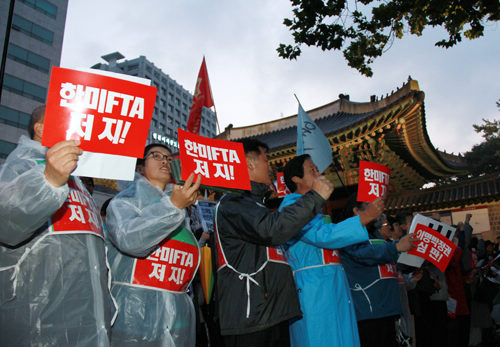|
 |
|
PROTESTING: South Koreansrally against the U.S.-South Korean Free Trade Agreement in Seoul on October 15 (HE LULU) |

The United States will host the 19th APEC Economic Leaders' Meeting in Honolulu, Hawaii, on November 12-13. The 21-member APEC is a premier forum for facilitating economic growth, cooperation, trade and investment in the Asia-Pacific region.
This summit is aimed at building a "seamless regional economy." It will focus on three topics: strengthening regional economic integration and expanding trade; promoting green growth; and expanding regulatory cooperation and advancing regulatory convergence.
The United States holds great expectations for this summit, and has been preparing for it for a long time. Predictably, U.S. President Barack Obama will be the dominant figure at the meeting.
Why is the United States attaching so much importance to the meeting? This is the first time the United States has hosted the APEC Summit since 1993 when the Fifth APEC Summit was held in Seattle. But this is not the main reason. The main reason is this summit carries extraordinary significance for the U.S. Government.
Although three years has passed since the global financial crisis broke out in September 2008, the United States has yet to escape its impact. The U.S. economy remains sluggish, with weak GDP growth and an unemployment rate up to 9.1 percent. Currently, its government debt and fiscal deficit remain high. To boost the economy has become Obama's top priority. Whether he can succeed in this task will directly determine his political career in the 2012 presidential campaign.
Against this backdrop, the United States has paid special attention to cementing economic ties with other countries. One of its major focuses is the Asia-Pacific region, which is enjoying the most rapid growth across the globe. Currently, APEC economies account for 43 percent of global trade and 55 percent of global GDP. With a market of 2.7 billion consumers, they purchase 58 percent of U.S. exported goods. Of the 15 biggest trade partners of the United States, seven are APEC members. Of course, the United States will make the most of this summit to satisfy its strategic needs.
Recently, U.S. Secretary of State Hillary Clinton has been active in promoting this summit. She published an article titled America's Pacific Century in the Foreign Policy magazine of October 11, 2011. Then, she delivered four consecutive speeches on U.S. economic strategy.
The United States sees great value in this upcoming summit partly because it intends to forcefully promote the establishment of a Free Trade Area of the Asia Pacific through hosting this summit, so as to counterbalance regional cooperation in East Asia.
In order to prevent the United States from being excluded from East Asian cooperation, after this APEC Summit, Obama will attend the East Asia Summit in Indonesia on November 19. It will be the first time for him to attend this event.
Moreover, the United States plans to make use of this summit to seek dominance in the Asia-Pacific region in keeping with its strategy of "return to Asia." It also intends to take the lead in building a new Asia-Pacific economic cooperation framework by pushing for the Trans-Pacific Strategic Economic Partnership Agreement (TPP) at the summit.
All these economic measures, coupled with security cooperation with its allies, are designed to enhance the U.S. strategic influence in the Asia-Pacific region.
Launched in 2006 by Singapore, New Zealand and Chile with the aim of promoting regional economic cooperation, the TPP currently includes nine members: Australia, Brunei, Chile, New Zealand, Peru, Singapore, Viet Nam, the United States and Malaysia.
| 